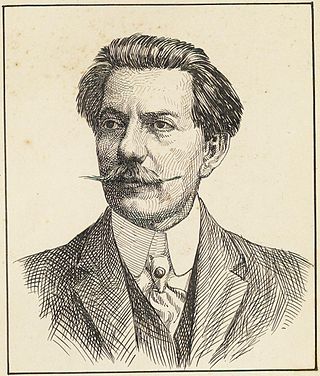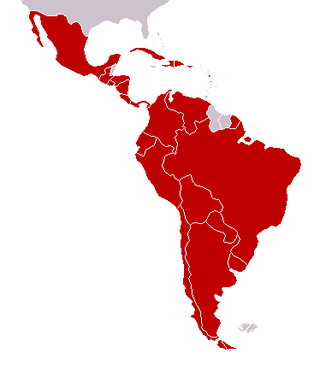
Latin America are the countries and regions of the Americas where Romance languages—languages derived from Latin—are predominantly spoken. The term was coined in France in the mid-19th century to refer to regions in the Americas that were ruled by the Spanish, Portuguese, and French empires. The term does not have a precise definition, but it is "commonly used to describe South America, Central America, Mexico, and the islands of the Caribbean." In a narrow sense, it refers to Spanish America and Brazil. The term "Latin America" is broader than Hispanic America, which specifically refers to Spanish-speaking countries; and lesser than categories such as Ibero-America, a term that refers to both Spanish and Portuguese-speaking countries from Europe and Americas.
Macrobius Ambrosius Theodosius, usually referred to as Macrobius, was a Roman provincial who lived during the early fifth century, during late antiquity, the period of time corresponding to the Later Roman Empire, and when Latin was as widespread as Greek among the elite. He is primarily known for his writings, which include the widely copied and read Commentarii in Somnium Scipionis about Somnium Scipionis, which was one of the most important sources for Neoplatonism in the Latin West during the Middle Ages; the Saturnalia, a compendium of ancient Roman religious and antiquarian lore; and De differentiis et societatibus graeci latinique verbi, which is now lost. He is the basis for the protagonist Manlius in Iain Pears' book The Dream of Scipio.

Scottish literature is literature written in Scotland or by Scottish writers. It includes works in English, Scottish Gaelic, Scots, Brythonic, French, Latin, Norn or other languages written within the modern boundaries of Scotland.

Mário Raul de Morais Andrade was a Brazilian poet, novelist, musicologist, art historian and critic, and photographer. He wrote one of the first and most influential collections of modern Brazilian poetry, Paulicéia Desvairada, published in 1922. He has had considerable influence on modern Brazilian literature, and as a scholar and essayist—he was a pioneer of the field of ethnomusicology—his influence has reached far beyond Brazil.

Antônio Mariano de Oliveira was a Brazilian poet, pharmacist and professor. He is better known by his pen name Alberto de Oliveira.
Latin American literature consists of the oral and written literature of Latin America in several languages, particularly in Spanish, Portuguese, and the indigenous languages of the Americas. It rose to particular prominence globally during the second half of the 20th century, largely due to the international success of the style known as magical realism. As such, the region's literature is often associated solely with this style, with the 20th century literary movement known as Latin American Boom, and with its most famous exponent, Gabriel García Márquez. Latin American literature has a rich and complex tradition of literary production that dates back many centuries.
Latin American culture is the formal or informal expression of the people of Latin America and includes both high culture and popular culture, as well as religion and other customary practices. These are generally of Western origin, but have various degrees of Native American, African and Asian influence.
Don Kulick is a Swedish anthropologist and linguist who is the professor of anthropology at Uppsala University. Kulick works within the frameworks of both cultural and linguistic anthropology, and has carried out field work in Papua New Guinea, Brazil, Italy and Sweden. Kulick is also known for his extensive fieldwork on the Tayap people and their language in Gapun village of East Sepik Province, Papua New Guinea.
Manuel Inácio da Silva Alvarenga (1749–1814) was a Brazilian poet. He had a life-long commitment to life-long learning and promoting civic values and educational reforms. Silva Alvarenga edited one of the first newspapers in Brazil, O Patriota.
Latin American art is the combined artistic expression of South America, Central America, the Caribbean, and Mexico, as well as Latin Americans living in other regions.

Slavery in Brazil began long before the first Portuguese settlement. Slavery was established in 1516, with members of one tribe enslaving captured members of another. Later, colonists were heavily dependent on indigenous labor during the initial phases of settlement to maintain the subsistence economy, and natives were often captured by expeditions of bandeirantes. The importation of African slaves began midway through the 16th century, but the enslavement of indigenous peoples continued well into the 17th and 18th centuries.

There is no single system of races or ethnicities that covers all modern Latin America, and usage of labels may vary substantially.
Leslie Michael Bethell is an English historian and university professor, who specialises in the study of 19th- and 20th-century Latin America, focusing on Brazil in particular. He received both his Bachelor of Arts and doctorate in history at the University of London. He is emeritus professor of Latin American history, University of London, and emeritus fellow of St Antony's College, University of Oxford. Bethell has served as visiting professor at the University Research Institute of Rio de Janeiro, the University of California, San Diego, the University of Chicago, the Fundação Getulio Vargas in Rio de Janeiro, the University of São Paulo and most recently the Brazil Institute, King's College London from 2011 to 2017. He has been associated with the Woodrow Wilson International Center for Scholars for many years, most recently as senior scholar of the Brazil Institute from 2010 to 2015. He was a fellow of St Antony's College and founding director of the Centre for Brazilian Studies at the University of Oxford from 1997 to 2007. He was lecturer, reader and professor of Latin American history in the University of London from 1966 to 1992 and director of the University of London Institute of Latin American Studies from 1987 to 1992.

Poetry of Scotland includes all forms of verse written in Brythonic, Latin, Scottish Gaelic, Scots, French, English and Esperanto and any language in which poetry has been written within the boundaries of modern Scotland, or by Scottish people.

New Worlds, New Lives: Globalization and People of Japanese Descent in the Americas and from Latin America in Japan (ISBN 978-0804744621) is a 2002 academic book edited by Lane Ryo Hirabayashi, James A. Hirabayashi, and Akemi Kikumura-Yano and published by the Stanford University Press. The volume, edited by three Japanese American anthropologists, was produced by the Japanese American National Museum's International Nikkei Research Project. The same project produced the Encyclopedia of Japanese Descendants in the Americas: An Illustrated History of the Nikkei, and the two books are companion volumes.
Ronald H. Chilcote is a political economist from the United States. He is currently the Edward A. Dickson Emeritus Professor of Economics and Political Science at the University of California, Riverside, and has served as managing editor of the academic journal Latin American Perspectives since its founding in 1974. Chilcote's main area of research is on Brazil, Portugal and the former Portuguese colonies in Africa, as well as comparative politics, political economy and development theory.
Hana Wirth-Nesher is an American-Israeli literary scholar and university professor. She is Professor of English and American Studies at Tel Aviv University, where she is also the Samuel L. and Perry Haber Chair on the Study of the Jewish Experience in the United States, and director of the Goldreich Family Institute for Yiddish Language, Literature, and Culture.

Brazilian science fiction has been a part of Brazilian literature since the mid 19th century. The first works of Brazilian Science Fiction emerged in the decades following Brazil's independence. Brazilian science fiction has its roots in authors such as Augusto Emílio Zaluar in the novel O Doutor Benignus and Machado de Assis in the short story O Imortal (1882). The genre grew in popularity over the 20th century, reaching its first “golden age” in the late 1950s, bolstered by the work of publisher Gumercindo Rocha Dorea. Following the end of the military dictatorship in 1985, the genre has witnessed a renaissance, with an influx of new writers and diverse influences reshaping the genre

Latin America as a region has multiple nation-states, with varying levels of economic complexity. The Latin American economy is an export-based economy consisting of individual countries in the geographical regions of North America, Central America, South America, and the Caribbean. The socioeconomic patterns of what is now called Latin America were set in the colonial era when the region was controlled by the Spanish and Portuguese empires. Up until independence in the early nineteenth century, colonial Latin American regional economies thrived and worked things out. Many parts of the region had favorable factor endowments of deposits of precious metals, mainly silver, or tropical climatic conditions and locations near coasts that allowed for the development of cane sugar plantations. In the nineteenth century following independence, many economies of Latin America declined. In the late nineteenth century, much of Latin America was integrated into the world economy as an exporter of commodities. Foreign capital investment, construction of infrastructure, such as railroads, growth in the labor sector with immigration from abroad, strengthening of institutions, and expansion of education aided industrial growth and economic expansion. A number of regions have thriving economies, but "poverty and inequality have been deeply rooted in Latin American societies since the early colonial era."
Maurizio Bettini is an Italian philologist, anthropologist and novelist. He is a professor of classical philology at the University of Siena and director of Siena's Centre for the Study of Anthropology and the Ancient World.








